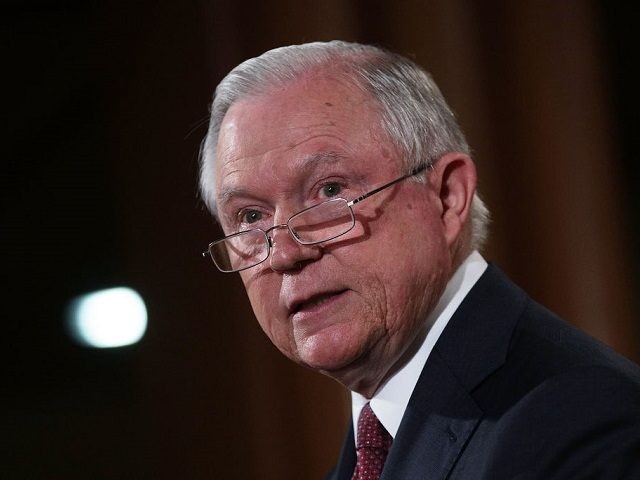Attorney General Jeff Sessions stood by President Donald Trump in Manchester, New Hampshire, Monday as the president announced his new strategy to tackle the opioid crisis, including seeking the death penalty for certain drug dealers.
“At the Department of Justice, we have made ending the drug epidemic a priority. We will continue to aggressively prosecute drug traffickers, and we will use federal law to seek the death penalty wherever appropriate,” Jeff Sessions said in a statement after he appeared with Trump.
Trump’s support for executing drug dealers, citing the success of the policy in more authoritarian regimes, created a huge splash. But the death penalty is, theoretically, already on the books for certain “drug kingpins” who traffic in quantities on the order of hundreds of kilograms of heroin or cocaine, due to a 1988 law that was expanded in 1994. There is also a multitude of state and federal statutes that allow for the death penalty for drug dealers when someone dies as a result of using their wares.
As a practical matter, however, no one has ever been sentenced to death under any of these laws. They are likely unconstitutional under current Supreme Court precedent. In 2008’s Kennedy v. Louisiana, the High Court found it a violation of the Eighth Amendment’s ban on “cruel and unusual punishment” to execute a man convicted of raping, but not killing, a child. The case built on 1977’s Coker v. Georgia, which found the same for an adult rapist.
The strong implication of these and other Supreme Court cases is that the death penalty in the United States is only constitutional for murder and possibly for crimes against the state, such as treason, espionage, and desertion in wartime. In Kennedy, the second category was not addressed, and it was not decided whether “drug kingpin activity” could be considered a crime against the state. (Justice Samuel Alito’s dissent argued it was arbitrary to consider it one.) Regardless, changes on the Supreme Court since 2008 could potentially mean the constitutionality of the death penalty’s use for offenses other than murder or crimes against the state will be revisited.
The last time any jurisdiction in the United States executed someone for a crime other than murder was 1964 when Alabama electrocuted a man convicted of robbery and Missouri gassed another for rape. Soviet spies Julius and Ethel Rosenberg, electrocuted for conspiracy to commit espionage in 1953, were the last non-murderers executed by the federal government.
Theoretically, however, United States’ attorneys, acting under the direction of the attorney general, could seek the death penalty for top-level drug dealers without any further legislation from Congress.
Sessions was broadly supportive of Trump’s opioid plan, which includes a new anti-drug advertising campaign and wider distribution of the lifesaving anti-overdose drug, Narcan, in high schools and universities. He explained:
Drug dealers show no respect for human dignity and put their own greed ahead of the safety and even the lives of others. Drug trafficking is an inherently violent and deadly business: if you want to collect a drug debt, you collect it with the barrel of a gun. As surely as night follows day, violence and death follow drug trafficking, and murder is often a tool of drug traffickers.
…
I want to thank the president for his strong leadership on this issue, and I join him in sending the message that business as usual has ended.
It remains to be seen if the Trump administration will seek new legislation to support the plan to execute what the president described as “dealers and pushers.”

COMMENTS
Please let us know if you're having issues with commenting.